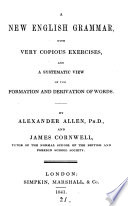 | Edinburgh (Scotland) - 1836 - 436 pages
...an affections and talents to be directed by reason.— Journal of Education,' SHALL AND WILL — '" Will" in the first person. and "shall" in the second and third, signify resoh. tion. Simple futrrrityis expressed by "*hall"inti? first and "will" in the two others.... | |
 | Alexander Allen - 1841 - 206 pages
...in the first person, and by will in the second and third ; and the determination of the speaker by will in the first person, and shall in the second and third. EXERCISE CXXVI. (5®" Underscore the sentences implying the determination of the speaker : — I shall... | |
 | Lindley Murray, Allen Fisk - 1846 - 180 pages
...the speaker, or simple futurity, according to certain habits of collocation with certain nominatives* Will, in the first person, and shall, in the second and third, signify resolution. Simple futurity is expressed by shall in the first person and will in the two others.... | |
 | John Hunter - English language - 1848 - 224 pages
...thou hast been wandering. He wished for the wings of an eagle, that he might fly away to those happy * Will in the first person, and shall in the second and third persons, might be included with may, can, and must, as potential auxiliaries; while, on the other hand, may,... | |
 | John Hunter (of Uxbridge.) - 1848 - 224 pages
...hast been wandering. He wished for the wings of an eagle, that he might fly away to those happy * Witt in the first person, and shall in the second and third persons, might be included with may, can, and must, as potential auxiliaries; while, on the other hand, may,... | |
 | Allen Hayden Weld - English language - 1849 - 236 pages
...remain longer." 12. The difference between shall and will may be expressed in a general way as follows : Will in the first person, and shall in the second and third, signify resolution. Simple futurity is expressed by shall in the first, and will in the two others.... | |
 | Lewis Grout - Zulu language - 1859 - 498 pages
...going to see. 2. In the shortest, contracted, or o form, they express a determination, a command, like will in the first person, and shall in the second and third, in English ; thus, Sotanda, we will love; no hamba, ye shall walk. (See § 53., 6.) 3. The verb uku... | |
 | James Roscoe Mongan - 1864 - 300 pages
...affirmative sentences, shall, in the first person, and will, in the second and third imply mere futurity; will, in the first person, and shall, in the second and third denote determination, a command, a threat, or a promise.1 ILLUSTRATIONS, (a^. In affirmative sentences,... | |
 | California. Department of Public Instruction - Education - 1873 - 390 pages
...the intention to do a thing regardless of any opposition 00 In conditional cases assumed as a fact. Will in the first person and shall in the second and third denote futurity, but shall in the first and will in the second and third denote determination. •... | |
 | George Gill (schoolmaster.) - 1874 - 170 pages
...been. Shall in the First Person, and mill in the Second acd Third Persona, simply denote futurity. Will in the First Person, and shall in the Second and Third Persons, denote authorit.e- in an emphatic mauner. CONDITIONAL MOOD. PRESENT IMPERFECT TENSE. Singular, 1.—... | |
| |